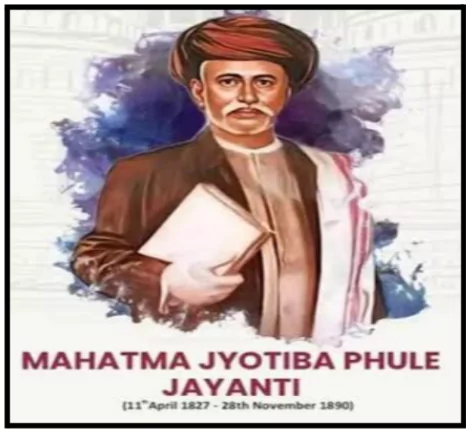On April 11, 2025, India commemorates the 199th birth anniversary of social reformer Jyotiba Phule, widely known as Jyotiba Phule Jayanti.
About Mahatma Jyotiba Phule
- Full Name: Jyotirao Govindrao Phule (popularly known as Mahatma Jyotiba Phule)
 Born: 11 April 1827, Pune, Maharashtra.
Born: 11 April 1827, Pune, Maharashtra.- Marriage: At the age of 13, married Savitribai Phule, who later became his partner in social reform.
- Education and Awakening:
- Studied at Scottish Mission High School, Pune.
- Exposed to Western thinkers like Thomas Paine (Age of Reason, The Rights Of Man) and John Stuart Mill, which deeply influenced his worldview.
- A turning point came in 1848, when he faced caste discrimination at a Brahmin friend’s wedding, awakening him to systemic injustice.
- He saw education and empowerment of women and lower castes as the key to eradicating social inequalities in India.
- Jyotiba Phule’s Ideology:
- Equality & Justice: Advocated for a just society free of caste and gender discrimination.
- Rationalism: Rejected blind faith, Brahmanical authority, and superstition.
- Social Justice: Promoted the dignity of all humans regardless of caste or gender.
- Mahatma Title: Jyotirao Phule was honored with the title “Mahatma” on May 11, 1888, by Maharashtrian social activist Vithalrao Krishnaji Vandekar.
Major Social Contributions
- Critique of the Caste System: He was a strong opponent of Brahmanical dominance and caste-based discrimination.
- He called for the abolition of the caste system through education and rational thought.
- A Bold Voice Against Orthodoxy: Phule clashed with nationalists like Vishnu Shashtri Chiplunkar, Bal Gangadhar Tilak, choosing instead to work with the British for the upliftment of Dalits and women.
- Women’s Empowerment: He championed women’s rights, particularly girls’ education and widow remarriage. He worked tirelessly with Savitribai Phule to fight gender inequality.
- Formation of Satyashodhak Samaj (Society of Truth-Seekers) in September 1873: The body was intended as an alternative to the largely upper-caste dominated reform movements such as the Brahmo Samaj, the Prarthana Samaj, as well as the Arya Samaj movements.
- First Girls’ School (1848): Phule and his wife Savitribai cofounded the first school for girls in India. The curriculum of the school included science, math, social studies, and practical training.
- Schools for Marginalised: He set up schools for Dalits and backward castes.
- Night Schools: By 1855, Phule had also opened night schools in Pune, intended as a centre of learning for workers, farmers, and working women who were busy during the day
Major Literary Contributions
- Gulamgiri (Slavery): A powerful critique of caste-based oppression in India, comparing it with slavery in America.
- Shetkaryacha Asud (Farmer’s Whip), 1881: Focuses on the condition of farmers and suggests practical reforms for their upliftment.
- Satsar (The Essence of Truth): Phule defended the right of Pandita Ramabai to convert to Christianity, the only non-Christian defence of its sort. The text is imagined as a dialogue between a Brahman and a Shudra.
- Manav Mahammand (Muhammad the man): A poetic tribute praising Prophet Muhammad for his role in liberating people from superstition and orthodoxy.
- Sarvajanik Satya Dharma Pustak: Considered his philosophical testament; emphasizes universal humanism, rationalism, and critiques sectarian religion.
- Trutyache Bhashan reflects Phule’s reformist thoughts.
Conclusion
Mahatma Phule challenged caste oppression, religious orthodoxy, and social injustice with bold rationalism. His works remain foundational in India’s fight for equality and human dignity.
![]() 11 Apr 2025
11 Apr 2025

 Born: 11 April 1827, Pune, Maharashtra.
Born: 11 April 1827, Pune, Maharashtra.